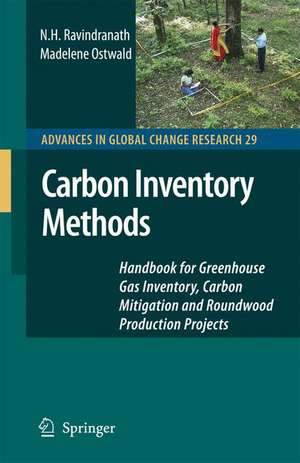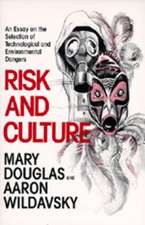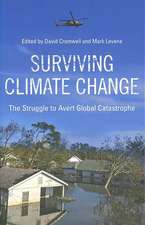Carbon Inventory Methods: Handbook for Greenhouse Gas Inventory, Carbon Mitigation and Roundwood Production Projects: Advances in Global Change Research, cartea 29
Autor N.H. Ravindranath, Madelene Ostwalden Limba Engleză Hardback – 30 noi 2007
| Toate formatele și edițiile | Preț | Express |
|---|---|---|
| Paperback (1) | 1039.42 lei 38-44 zile | |
| SPRINGER NETHERLANDS – 22 noi 2010 | 1039.42 lei 38-44 zile | |
| Hardback (1) | 1225.94 lei 6-8 săpt. | |
| SPRINGER NETHERLANDS – 30 noi 2007 | 1225.94 lei 6-8 săpt. |
Din seria Advances in Global Change Research
- 15%
 Preț: 636.12 lei
Preț: 636.12 lei -
 Preț: 439.83 lei
Preț: 439.83 lei - 18%
 Preț: 895.45 lei
Preț: 895.45 lei - 15%
 Preț: 648.24 lei
Preț: 648.24 lei - 18%
 Preț: 1036.54 lei
Preț: 1036.54 lei - 18%
 Preț: 894.16 lei
Preț: 894.16 lei - 18%
 Preț: 963.60 lei
Preț: 963.60 lei - 18%
 Preț: 1239.49 lei
Preț: 1239.49 lei - 15%
 Preț: 649.71 lei
Preț: 649.71 lei - 18%
 Preț: 1243.78 lei
Preț: 1243.78 lei - 18%
 Preț: 1114.02 lei
Preț: 1114.02 lei - 15%
 Preț: 648.89 lei
Preț: 648.89 lei - 18%
 Preț: 960.78 lei
Preț: 960.78 lei - 15%
 Preț: 643.99 lei
Preț: 643.99 lei - 18%
 Preț: 1834.44 lei
Preț: 1834.44 lei - 15%
 Preț: 649.06 lei
Preț: 649.06 lei - 18%
 Preț: 955.70 lei
Preț: 955.70 lei - 18%
 Preț: 956.03 lei
Preț: 956.03 lei - 18%
 Preț: 1232.26 lei
Preț: 1232.26 lei - 18%
 Preț: 955.88 lei
Preț: 955.88 lei - 18%
 Preț: 959.19 lei
Preț: 959.19 lei - 18%
 Preț: 944.82 lei
Preț: 944.82 lei - 18%
 Preț: 1105.19 lei
Preț: 1105.19 lei - 15%
 Preț: 644.49 lei
Preț: 644.49 lei - 15%
 Preț: 643.99 lei
Preț: 643.99 lei - 18%
 Preț: 1841.54 lei
Preț: 1841.54 lei - 18%
 Preț: 954.62 lei
Preț: 954.62 lei - 5%
 Preț: 1414.80 lei
Preț: 1414.80 lei
Preț: 1225.94 lei
Preț vechi: 1495.04 lei
-18% Nou
Puncte Express: 1839
Preț estimativ în valută:
234.58€ • 245.58$ • 194.10£
234.58€ • 245.58$ • 194.10£
Carte tipărită la comandă
Livrare economică 07-21 aprilie
Preluare comenzi: 021 569.72.76
Specificații
ISBN-13: 9781402065460
ISBN-10: 1402065469
Pagini: 339
Ilustrații: XX, 306 p.
Dimensiuni: 155 x 235 x 25 mm
Greutate: 0.68 kg
Ediția:2008
Editura: SPRINGER NETHERLANDS
Colecția Springer
Seria Advances in Global Change Research
Locul publicării:Dordrecht, Netherlands
ISBN-10: 1402065469
Pagini: 339
Ilustrații: XX, 306 p.
Dimensiuni: 155 x 235 x 25 mm
Greutate: 0.68 kg
Ediția:2008
Editura: SPRINGER NETHERLANDS
Colecția Springer
Seria Advances in Global Change Research
Locul publicării:Dordrecht, Netherlands
Public țintă
ResearchCuprins
Global Carbon Cycle, Carbon Dioxide Emissions and Mitigation.- Categories of Activities, Programmes and Projects Requiring Carbon Inventory.- Carbon Pools and Measurement Frequency for Carbon Inventory.- Carbon Inventory in Project Development, Implementation and Monitoring Phases.- Methodological Issues in Land-Based Projects.- Carbon Inventory Under Baseline and Project Scenarios.- Techniques for Estimation and Monitoring of Project Areas and Boundary.- Generic Methods for Inventory of Carbon Pools.- Methods for Estimating Above-Ground Biomass.- Methods for Below-Ground Biomass.- Methods for Dead Organic Matter: Deadwood and Litter.- Methods for Estimating Soil Organic Carbon.- Remote Sensing and GIS Techniques for Terrestrial Carbon Inventory.- Modelling for Estimation and Projection of Carbon Stocks in Land-Use Systems.- Carbon Inventory Methods for National Greenhouse Gas Inventory.- Estimation of Carbon Stocks and Changes and Data Sources.- Uncertainty Estimation, Quality Assurance and Quality Control.- Implications of Climate Change for Carbon Stocks and Inventory.
Recenzii
From the reviews:
"The format of the book makes for easy reading and understanding and is excellent for forest management, climate change mitigation, and environmental scientists … . To be precise, Ravindranath, N. H. and Madelene Ostwald’s book is therefore outstanding. In my opinion, their book will soon become a ‘must in the field. The expertise of the authors coupled with an excellent organization and objective presentation of material will certainly make this book a great success among students, teachers, and researchers." (Current Engineering Practice, 2008)
"The format of the book makes for easy reading and understanding and is excellent for forest management, climate change mitigation, and environmental scientists … . To be precise, Ravindranath, N. H. and Madelene Ostwald’s book is therefore outstanding. In my opinion, their book will soon become a ‘must in the field. The expertise of the authors coupled with an excellent organization and objective presentation of material will certainly make this book a great success among students, teachers, and researchers." (Current Engineering Practice, 2008)
Textul de pe ultima copertă
Carbon inventory requiring estimation of carbon dioxide emissions and removals in land-use categories for national greenhouse gas inventory and changes in stocks of carbon in projects aimed at climate change mitigation has become increasingly important in global efforts to address climate change. Hence, there is a need for a handbook that provides guidelines and methods required for carbon inventory.
Carbon Inventory Methods Handbook provides detailed step-by-step information on sampling procedures, field and laboratory measurements, application of remote sensing and GIS techniques, modeling, and calculation procedures along with sources of data for carbon inventory.
The unique feature of this handbook is that it provides practical guidance on carbon inventory methods for four kinds of projects, namely, 1) development, implementation and monitoring of carbon mitigation in forest, agriculture and grassland sectors, 2) national greenhouse gas inventory in agriculture, forest, and other land-use categories, 3) forest, grassland and agroforestry development and 4) commercial and community forestry roundwood production.
Carbon Inventory Methods Handbook is an essential source of reference to universities and research institutions dealing with climate change, consultancy and non-governmental organizations involved in developing and monitoring land-based mitigation projects, donor agencies funding carbon mitigation projects, national greenhouse gas inventory agencies, United Nations agencies and mechanisms such as Clean Development Mechanism and Global Environment Facility, roundwood production and land reclamation project developers and managers, and forest departments.
Carbon Inventory Methods Handbook provides detailed step-by-step information on sampling procedures, field and laboratory measurements, application of remote sensing and GIS techniques, modeling, and calculation procedures along with sources of data for carbon inventory.
The unique feature of this handbook is that it provides practical guidance on carbon inventory methods for four kinds of projects, namely, 1) development, implementation and monitoring of carbon mitigation in forest, agriculture and grassland sectors, 2) national greenhouse gas inventory in agriculture, forest, and other land-use categories, 3) forest, grassland and agroforestry development and 4) commercial and community forestry roundwood production.
Carbon Inventory Methods Handbook is an essential source of reference to universities and research institutions dealing with climate change, consultancy and non-governmental organizations involved in developing and monitoring land-based mitigation projects, donor agencies funding carbon mitigation projects, national greenhouse gas inventory agencies, United Nations agencies and mechanisms such as Clean Development Mechanism and Global Environment Facility, roundwood production and land reclamation project developers and managers, and forest departments.
Caracteristici
Unique since it is driven for a clearly identified need and a growing need for ‘carbon inventory’ for land use sections such as forests Provides practical guidance, in a user-friendly way, on methods, tools and techniques, together with examples










